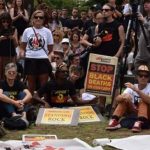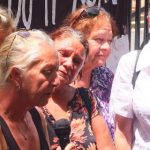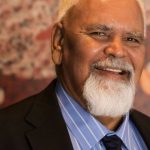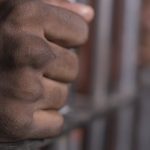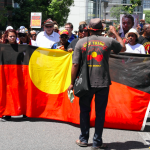Refugees On Sovereign Soil: An Interview with Koradji Aboriginal Tent Embassy’s Gabitja
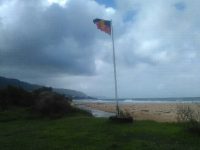
The original Aboriginal Tent Embassy was founded on the lawns of what is now called old Parliament House in Canberra on Invasion Day, January 26 1972. Four Indigenous activists instigated the protest that’s still going strong 45 years later.
These young men were Billy Craigie, Bertie Williams, Tony Coorey and Michael Ghillar Anderson: the last surviving member of the pioneering group.
At the time, then Australian prime minister Billy McMahon was trying to implement a lease system with the nation’s First Peoples, allowing them to make economic and social use of the land, but excluding them from mineral and forestry resources.
Sovereignty was never ceded
But unsurprisingly, considering the Indigenous inhabitants of the island had never ceded sovereignty what they were demanding was full land rights. The tent embassy demonstration gained traction and at one point there were around 2,000 supporters camped out alongside them.
The government grew annoyed and modified trespassing laws forcing the camp to leave. Protesters eventually returned, but renowned Aboriginal rights activist Charles Perkins negotiated that the embassy would move on, as long as the Aboriginal Land Rights Act 1976 was enacted.
Makeshift embassies on sovereign land
However, the original Aboriginal Tent Embassy is still active today, and its grassroots example has provoked many similar Indigenous movements to mobilise on their own sovereign land throughout the country.
The Brisbane Aboriginal-Sovereign Embassy situated in Musgrave Park, was where Indigenous activists coordinated protests against the G20 summit in 2014.
This embassy was also the site where a meeting between the various state groups working against the forced removals of Indigenous children by government departments was also held.
This meeting resulted in a national stop the stolen generation movement being formed.
The Redfern Aboriginal Tent Embassy
Another example of a makeshift embassy mounting a successful protest on sacred Indigenous land was the Redfern Aboriginal Tent Embassy.
Camped out for over a year on an area known as the Block, Jenny Munro led a campaign that secured affordable Aboriginal housing in the face of a redevelopment project on the area of land that’s been the heart of Sydney’s Aboriginal community for decades.
The Koradji Aboriginal Tent Embassy
The Koradji Aboriginal Tent Embassy, is another such protest camp, situated in the Wollongong area. It’s been in operation for around 17 years.
The local Indigenous inhabitants put up a 13 year legal battle, which resulted in the region being declared a protected Aboriginal place by the NSW state government.
Unfortunately, over recent months the likelihood of whether the land will stay in the hands of the local inhabitants is in jeopardy as one of the original founders of the Embassy is considering making a deal with a company to develop the area.
Sydney Criminal Lawyers® spoke with Gabitja, at the Koradji Aboriginal Tent Embassy, about the traditional owners quest to prevent the land grab and sell out of their homelands.
So the original Aboriginal Tent Embassy was set up by four Indigenous rights activists in Canberra on Invasion Day in 1972. What was happening at that time to spur on such an action?
It began because we as a people have been invisible in our own country. It was a political statement to show that we are refugees in our own country. And that’s why the Embassy was set up.
At that time, the McMahon government wanted to set up a lease system, rather than a system of land rights. Why was the government pushing for the lease system? What was the actual difference between it and a system of land rights?
Let’s have a look at the big picture.
What the government, or what the Crown has been doing from the very beginning, is just dispossessing us of our land. So what they want our people to do is abandon our own land, so we can lease inside of their system to show that we’re not on our lands and we’re in their system.
And that’s what they’re continuing to do today. That’s been their policy from the outset and that’s what’s happening right now.
Look at what’s happening in Western Australia. What’s happened recently with those people is they’ve been blocked off their homelands.
This is exactly what’s happening. They want to show that we’re not on our lands anymore. They want to get rid of us from our own lands according to our own laws.
And the lease system would have set that up in an easier way for that to happen?
The lease system shows – in their way – that we’re in their system.
But today, 45 years on, the original Aboriginal Tent Embassy is still there. What would you say the main motivation for having the embassy still going today is?
Just have a look around and have a look at what’s happening to our people.
We have a stolen generation that’s bigger than the one that got recognised and got apologised for – that’s happening now. Most of our people are being incarcerated. I’m talking about our men, our women and our children in so many different institutions, you know, whether it be in gaol, or in foster homes.
That’s an industry of the government. There’s lots of people that are profiting from the kidnapping of our people. Whether that be in a foster home, institutions, juvenile justice – all these things.
There’s no justice in this country for our people. We don’t have any levity or recourse inside of the judicial system, that’s just a fact.
You told me that there’s a bit of contention going on between those who are running the Koradji Aboriginal Tent Embassy at the moment. Can I ask what’s going on in regards to that?
Ok. Well what’s happening is that the people who are here, one of the founders of this embassy, he’s currently serving a 17 year prison sentence. But he thinks he can run this embassy from his cell and with the influence of his family.
And the community is outraged about that and that’s what’s happening at this point in time. People are reassessing all of this. He’s been detained for a year now. Visibly there’s no embassy, or people don’t think there’s an embassy.
There’s no sacred fire, things like that, that constitute an embassy.
So it’s in the community’s hands right now and looking at what the next step is going to be for all this business.
But as far as I can tell, the embassy will rise again, because the family in question wants to get rid of the Aboriginal place. The Embassy will have to rise again.
But back in 1972 the original tent embassy was removed for a while. It was then reinstated in 1974, before Indigenous rights activist Charles Perkins negotiated to remove the protest site as long as the Aboriginal Land Rights Act 1976 was enacted.
So what happened with this? What did the land rights act actually establish for Aboriginal people?
I guess it went hand in hand with making the land council systems in this state.
And what have the land councils done for Aboriginal people?
Chaos and corruption. The land councils are a land lottery system. The land supposedly gets given back to the land council, but the land councils in this state, mostly everywhere, are selling the land.
And it’s not the people, the original people, or tribes, clans or traditional owners, or however you want to call them. They’re usually not in power.
It’s usually some foreign or other families that become involved and they have big numbers and big voting rights and they usually vote out the traditional people of those countries.
And at the end of the day those lands get laundered and sold.
That’s what happens unfortunately.
Last month, the federal court ruled that the Noongar native title settlement was invalid because not all claimants signed the agreement. Attorney general George Brandis is trying to rush legislation through parliament to reverse the outcome of that case, so not all claimants have to sign, just a majority will.
What do you think the outcome will be if this legislation is passed?
Australian legislation? I’ll just go back to the question.
You’re talking about Australian legislation and I’ll say where’s the treaty that occurred for us to be involved in Australian legislation.
This is all international affairs and the business has been swept under the carpet.
Over recent years the government has been pushing for constitutional recognition – to have Indigenous people written into the Australian constitution. What do you think about this proposal? What significance do you think constitutional recognition has for Aboriginal and Torres Strait Islander people?
It’s a joke. But my question to you is what status does the Australian government have in regards to being a sovereign entity of its own?
They don’t?
They don’t.
And why is that?
Because there has been no treaties here. The Australian government is occupying this country. It’s an occupation here. Now because there has been no treaties under the laws, the Australian government is not a civil government. It is a military government. There have been no treaties that they wanted to recognise here.
Though there have been some treaties here. You know about Batman’s treaty?
Yes.
Governor Bourke came out and quashed that straight away: the fifth proclamation made in 1835. We know about the Treaty between Windradyne and Governor Brisbane and that was on December 24 1827. And the previous one was with Macquarie in that country as well, Wiradjuri country. What happened to that?
What did?
Well we don’t know. It’s all swept under the carpet, isn’t it?
But my point is, the war between Wiradjuri and the Crown is a recognised one. It’s like the battle of Pinjarra is a recognised one. You know the Black War in Tasmania is all recognised. But we need to end these wars proper.
There has been no peace treaties made.
And looking at the government, as a military government, the people that they’ve subjugated: mainly our people are not citizens.
Military governments can’t offer us citizenship. And that’s why you’ve got the call for the constitution to make them citizens.
Well, you know, why aren’t we citizens already, because it’s a military government and they cannot bring us in like that unless there’s peace.
Now if a peace treaty is struck then they can become a civil government then. But they don’t. And it’s quite illegal for a military government to try and makes us part of their citizenry.
And that’s what constitutional recognition would entail?
It’s an illegal act.
Whose constitution is it anyway? Is it the Australian government’s or does it still belong to the British parliament, which one?
And that’s the question isn’t it. That isn’t answered.
Exactly.
And my last question for you is, many Indigenous rights activists reject the idea of constitutional recognition. They point towards a treaty, or a series of treaties with each of the Indigenous nations.
In your opinion, how would that work? And what do you think would be outlined in such agreements?
- I don’t know what everybody would want to establish in their own lands. I’m not qualified to answer that and I don’t know who is.
But we must end the war that’s happening against our people. That’s what we must end. There is a genocide that’s occurring. And I’m not just saying that because of activism.
There is a genocide that’s occurring. Just yesterday there a big funeral down here. And there was one last week, and the week before and the week before that.
You know about the life span of our people don’t you? Do you know about the life expectancy of our males and females?
I don’t have the exact figures off the top of my head, but I am well aware that it’s much lower than the life expectancy of the rest of the population.
OK. The reality is a lot our older generation are gone, and then we’ve got a lot of young people that are dying if you look at our communities everywhere.
There’s a scourge of many things like that that are happening to our people in that regard. And then our families are being split up on top of all that.
This is all happening. We are under attack as a people.
Australia looks like a nice place. And people come out here out of war torn conditions and they come here and they enjoy our country.
But there’s a war that’s still happening here against our own people. And you know, let’s look at the evidence on that, some of it is that of the military government that has become a civil government.
Another one is the capture of our flag, what they call the Aboriginal flag. It was once a free flag, but it is now called the Aboriginal Corporate flag of Australia. When was that done? It was under the Flags Act of 1953. But it was all done in 1994, when the government proclaimed that it would make it an Australian flag.
That was not done at the consent of the people. The people didn’t consent to that. That is an act of war. It’s somebody’s flag and that is an act of war.
This is all an international issue. Now this is the thing, here in Australia we’re very isolated from the rest of the world. We don’t have very many neighbours, who can just poke their noses over the fence and have a look at what’s happening in the backyard here. This is what has stood against us for 200 or so years now.
But now we have social media. There’s lots of things in our favour now. But the world needs to actually see the truth of what’s happening now, because in international affairs, the big NGOs, like Oxfam or whoever, or even the United Nations, they don’t seem to recognise us as a people practicing our rights of self-determination.
What they do is they see us as a people that the Australian government would recognise us as internationally. They favour what the Australian government deems us as. They do not recognise our right to self-determination. What we would determine ourselves to be.
I understand what you are saying there.
Yeah. So these issues, these very, very major issues have to be all opened up on an international level, so they can be looked at, so the international community can examine these things. And look at Australian politics in regards to our affairs. And how it’s been treating us for the last 200 or so years.
Understood.
Absolutely. They treat us as aliens in this country. And that’s why the tent embassy was set up.
Gabitja thanks very much for taking the time out to have this chat with us today. And best of luck with your continuing work at the Koradji Aboriginal Tent Embassy and with the continued push to establish a treaty.
Thank you.
And I hope that it’s of some assistance because we really need to get our fight out into the international arena and it really needs to be done without prejudice: the prejudice of how the Australian government deems us.
That’s a major fight we have in itself. If we’re going to get justice in this country we really need to have the international community examine everything and examine the Crown’s occupation of our lands.
Understood. And thanks once again.
And thank you for your work.


